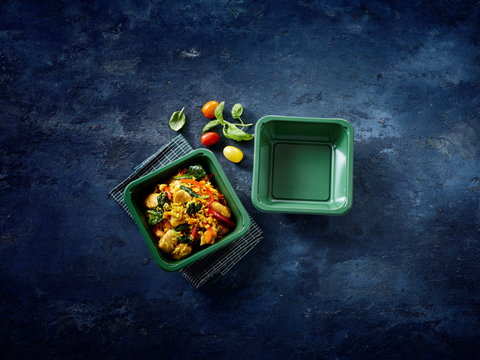
Faerch is releasing CPET ready meal trays containing at least 40% rPET from post-consumer trays recycled at kerbside – reportedly lowering the carbon footprint of virgin PET by 57%.
The Evolve by Faerch range was launched for the ready meals market five years ago. This recipe is compatible with up to 70% post-consumer recycled content, including mixed-colour ‘jazz’ bottle flakes.
Following the expansion of its Cirrec recycling facility, Faerch will implement a minimum of 40% rPET into its CPET trays for chilled ready meals from 1st January 2025. The rPET comprises post-consumer materials sourced from kerbside collection; Faerch offers customers third-party certification for its recycled content.
The recyclate is not expected to impact the CPET’s properties, but it is set to help customers pursue their sustainability commitments and close the loop on their food packaging by adopting a ‘significant amount’ of circular content.
This solution is hoped to help divert waste away from incineration and landfill, instead turning waste into a valuable resource. In turn, it aims to lower the reliance on fossil fuels in packaging and support a reduction in CO2 emissions.
According to a recently commissioned carbon footprint comparison study of input resins with an LCA practitioner, Faerch’s tray rPET has a 57% lower carbon footprint than virgin PET and saves 35% compared to clear bottle rPET.
Meanwhile, the packaging aims to align with increasing consumer demand and regulatory developments.
Faerch intends to take the trays into additional markets in the future, as well as increase the amount of rPET in its packaging.
“With this launch, we are not just introducing a new product; we are future-proofing the use of recycled content in our CPET ready meal trays,” says Faerch Group CEO Lars Gade Hansen.
“Faerch has always pushed the boundaries, and now we are taking it a step further by guaranteeing a minimum of 40% Tray rPET in our chilled ready meal trays, taking another step toward true circularity.
“Just like bottles must be transformed into new bottles, trays must be recycled into new trays without ‘stealing’ and downgrading material from other waste streams.”
Back in 2021, Faerch teamed up with Tesco to launch a closed-loop, tray-to-tray recycling solution. They worked to recover secondary plastic packaging from transport and display applications and recycle them into pots, tubs, and trays for food products.
The following year, Faerch used EREMA’s VACUREMA recycling process to recycle post-consumer pots, tubs, and trays into its food-grade rPET trays. The process involves decontamination, drying, and IV treatment in the vacuum reactor before the recyclate is fed into the extruder – apparently ensuring that rPET quality stays high even if the input material’s parameters vary.
Klöckner Pentaplast also revealed what it describes as the first food packaging tray comprised entirely of recycled tray material earlier this year. It is recommended for businesses looking to advance their ESG strategies and control eco-tax and plastic tax legislation costs.
If you liked this story, you might also enjoy:
The ultimate guide to the Packaging and Packaging Waste Regulation in 2024
How are the top brands progressing on packaging sustainability?
Sustainable Innovation Report 2024: Current trends and future priorities
Everything you need to know about global plastic sustainability regulation














No comments yet